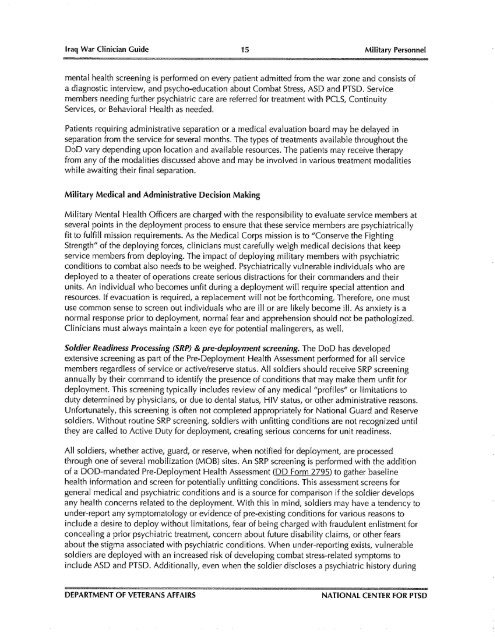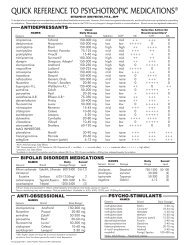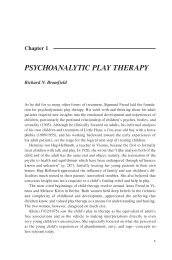IRAQ WAR CLINICIAN GUIDE
Iraq War Clinician's Guide - Network Of Care
Iraq War Clinician's Guide - Network Of Care
Create successful ePaper yourself
Turn your PDF publications into a flip-book with our unique Google optimized e-Paper software.
Iraq War Clinician Guide 15 Military Personnel<br />
mental health screening is performed on every patient admitted from the war zone and consists of<br />
a diagnostic interview, and psycho-education about Combat Stress, ASD and PTSD. Service<br />
members needing further psychiatric care are referred for treatment with PCLS, Continuity<br />
Services, or Behavioral Health as needed.<br />
Patients requiring administrative separation or a medical evaluation board may be delayed in<br />
separation from the service for several months. The types of treatments available throughout the<br />
DoD vary depending upon location and available resources. The patients may receive therapy<br />
from any of the modalities discussed above and may be involved in various treatment modalities<br />
while awaiting their final separation.<br />
Military Medical and Administrative Decision Making<br />
Military Mental Health Officers are charged with the responsibility to evaluate service members at<br />
several points in the deployment process to ensure that these service members are psychiatrically<br />
fit to fulfill mission requirements. As the Medical Corps mission is to "Conserve the Fighting<br />
Strength" of the deploying forces, clinicians must carefully weigh medical decisions that keep<br />
service members from deploying. The impact of deploying military members with psychiatric<br />
conditions to combat also needs to be weighed. Psychiatrically vulnerable individuals who are<br />
deployed to a theater of operations create serious distractions for their commanders and their<br />
units. An individual who becomes unfit during a deployment will require special attention and<br />
resources. If evacuation is required, a replacement will not be forthcoming. Therefore, one must<br />
use common sense to screen out individuals who are ill or are likely become ill. As anxiety is a<br />
normal response prior to deployment, normal fear and apprehension should not be pathologized.<br />
Clinicians must always maintain a keen eye for potential malingerers, as well.<br />
Soldier Readiness Processing (SRP) & pre-deployment screening. The DoD has developed<br />
extensive screening as part of the Pre-Deployment Health Assessment performed for all service<br />
members regardless of service or activelreserve status. All soldiers should receive SRP screening<br />
annually by their command to identify the presence of conditions that may make them unfit for<br />
deployment. This screening typically includes review of any medical "profiles" or limitations to<br />
duty determined by physicians, or due to dental status, HIV status, or other administrative reasons.<br />
Unfortunately, this screening is often not completed appropriately for National Guard and Reserve<br />
soldiers. Without routine SRP screening, soldiers with unfitting conditions are not recognized until<br />
they are called to Active Duty for deployment, creating serious concerns for unit readiness.<br />
All soldiers, whether active, guard, or reserve, when notified for deployment, are processed<br />
through one of several mobilization (MOB) sites. An SRP screening is performed with the addition<br />
of a DOD-mandated Pre-Deployment Health Assessment (DD Form 2795) to gather baseline<br />
health information and screen for potentially unfitting conditions. This assessment screens for<br />
general medical and psychiatric conditions and is a source for comparison if the soldier develops<br />
any health concerns related to the deployment. With this in mind, soldiers may have a tendency to<br />
under-report any symptomatology or evidence of pre-existing conditions for various reasons to<br />
include a desire to deploy without limitations, fear of being charged with fraudulent enlistment for<br />
concealing a prior psychiatric treatment, concern about future disability claims, or other fears<br />
about the stigma associated with psychiatric conditions. When under-reporting exists, vulnerable<br />
soldiers are deployed with an increased risk of developing combat stress-related symptoms to<br />
include ASD and PTSD. Additionally, even when the soldier discloses a psychiatric history during<br />
DEPARTMENT OF VETERANS AFFAIRS<br />
NATIONAL CENTER FOR PTSD




